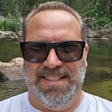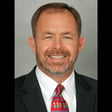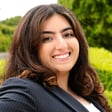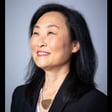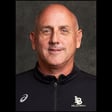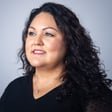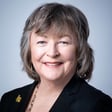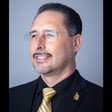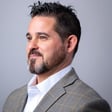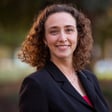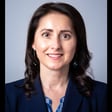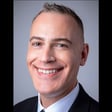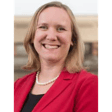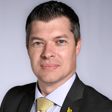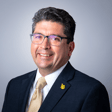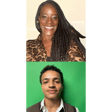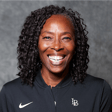Become a Creator today!Start creating today - Share your story with the world!
Start for free
00:00:00
00:00:01

S1 - E7: The Chairman of The Board (part 1)
Kenneth W. Miller ('69, '71), 49er Foundation Board Chair, on The Beach and its future.
Transcript
Introduction to the Host and Guest
00:00:17
Speaker
Hello, my name is Dan Montoya, Vice President for University Relations and Development and the host of At the Beach here at Cal State Long Beach. This podcast produced by URD shares news of accomplishments and honors, personal stories, and ways listeners can become involved with Cal State Long Beach. My guest today is a man who has worn many hats here at the beach and continues to do so, Kenneth W. Miller.
00:00:44
Speaker
Let's start with the most important aspect. Ken is a beach alumnus, a double alum. He holds a bachelor's degree and an MBA from Cal State Long Beach. And when he was a student, Ken was an ASI senator at large and ASI president.
00:01:01
Speaker
After graduation, Ken enjoyed a distinguished career with Xerox Corporation, where he started as a salesperson and was promoted to senior executive running the national accounts program on the West Coast.
Ken's Career Journey and Contributions
00:01:15
Speaker
He began teaching at USC's business school while still at Xerox and eventually went on to launch his award-winning management consulting and training company, Impact Associates, focused on strategic planning,
00:01:29
Speaker
leadership, and sales training. I'd be remiss if I didn't mention that Ken has taken his knowledge and talents back to his alma mater where he teaches in CSULB's College of Business Marketing Department. Ken also supports Cal State Long Beach as a leader and as a donor. He created an endowment for a president's scholarship for $100,000, was a member of the board
00:01:54
Speaker
of governors and currently serves as the chair of the 49er Foundation. Welcome Ken, it's so good to have you.
00:02:03
Speaker
here at the beach. Thank you, Dan. My mother will be very appreciative of your comments, and it's great to be with you today. That's awesome. Well, we just want to have a real conversation with you and just kind of dive a little bit into you and your experiences with the university, and most importantly, your role as the chair of the 49er Foundation.
00:02:27
Speaker
So, you know, how is it being back at your alma mater as a faculty member, as a donor, and now as the chair of the 49er Foundation Board? Being back, that's a great question. Actually, I feel like I've never really left ever since my student government experience and then my fraternity experience. I've been back for so many events over the years.
00:02:52
Speaker
homecomings and various school functions and the like. And it's been great. I guess to the question, though, reconnecting on a more formal level has been absolutely fantastic. This is such a great place. On any given day, there's something for everybody here at the university and so much for people to take advantage of.
00:03:18
Speaker
And that's one of the things we'll talk about as we get into this a little bit more. How do we really let people take advantage of this, which is the people's university. That's great. So let's get into
Teaching and Student Engagement Strategies
00:03:29
Speaker
your teaching. How long have you been teaching at the beach? And what's the biggest challenges you or your students face these days? And how has teaching changed in the time you've been here?
00:03:39
Speaker
Well, I've been teaching now six years. I was originally intending to do this for a year and hand this off to somebody else because I came in and worked with Mike Soult to create a professional selling class for the first time in the university. And I was very busy at the time. And I told Mike I would create the curriculum. I would teach it for a year. And then I'd pass it off. And I could get back to everything else that I was doing. Well, at the end of the first semester, it just became clear to me that that wasn't going to happen.
00:04:10
Speaker
I loved it so much. I love the students that are here. I love what we can do with them to prepare them for what they're going to experience when they go out into the real world. So six years later, I'm doing it with no intention of slowing down or doing something differently. It's just been a godsend. As far as what's changed and how learning has changed,
00:04:33
Speaker
I think the basics of learning and when I was here as a student and what goes on now is fairly similar in the sense that what our job is to do is to help our students really get masterful in three basic things. One is to do great critical thinking, the ability to solve problems and the ability to deal with change.
00:05:00
Speaker
And I think that was the case when I was here, and I think that's the case now. So those three basic core things remain in place. What's changed, however, is that with the advent of technology, everybody's
00:05:14
Speaker
attention span is significantly less. Everybody's on a fast pace to get something done, and that translates to the students in the classroom. And so the ability to capture their attention, keep their attention, have them understand that what you're teaching is relevant to their future and so forth is a greater challenge than I think it was previously.
00:05:37
Speaker
completely able to overcome that, but nonetheless it remains a challenge. These students are on their iPhones, you know, so many hours of the day, and so much of their life really revolves around that. And what we're competing for is mind space and the ability to be able to capture the attention to help them understand how what we're teaching them is going to be useful to them.
00:06:05
Speaker
in the future. Right. And, and so, you know, you've, you've done sales for so many years, you're teaching it, you know, and some of these students, you know, what are, are you surprised by the way they learn and how they present, present to, I know, cause they do consulting projects. Share a little bit about that. Yeah. So one of the things I have them do to make it as real experience as possible is I actually have them go out, they have to find a client,
00:06:32
Speaker
to go out and interview them, do a discovery call on them to find out what the biggest issues that this company is facing, to come back and to assimilate what they learned, then put together a company and present a solution to them. And actually, this coming Monday and Wednesday, they're going to be presenting to these real live clients exactly what they found.
00:06:57
Speaker
As far as their presentation skills, every semester I'm surprised at how good these students can be if given the opportunity to do it. So that's always exciting to see. What's more exciting, however, is when they get feedback from the client that A, you asked really good questions, B, you presented some terrific solutions. I had no idea you guys were covering this type of thing. I'm more excited about the kinds of students coming out of the university than I ever thought I would be.
00:07:26
Speaker
And actually, we've had a couple of clients that have hired our teams to do real work for them, real consulting work for them, after they were in the program. Making it real is what really makes the difference. And when the client tells in the classroom,
00:07:45
Speaker
you know, this was, this was great. I wish my people could do as well as you did. Then the satisfaction that comes from that, you can see it on their faces and of course my face as well. Right. And, and, and people can see what you're smiling and you light up when you're talking about it. And that's, that's so awesome. And I know that, you know, these students, everybody kind of characterizes different generations, different, you know,
00:08:12
Speaker
I'm worried about the generation to come, but what can you say about these students and how they're producing? I would tell them not to worry so much.
Challenges of First-Generation Students
00:08:22
Speaker
What I would tell them is that these are – well, just take our university.
00:08:28
Speaker
Over half of our students are first-generation students. So they grow up in households where they don't necessarily have the business maturity from talking around the table and the friends of their parents and things like that that other people would have if they weren't first gen. And so they come with that as a disadvantage. That said, they realize that very quickly, and they're eager to find ways to become more relevant, more mature, and to become more productive.
00:08:58
Speaker
The burden that they carry is that they, being the first in their families to be college graduates, have the familial responsibility of really lighting up the room, as you talked about, for their entire family, being the trendsetters to be role models for their cousins and their other kin.
00:09:25
Speaker
So as a result of that, they carry that responsibility. And in some of these families, just getting the college degree is like the ultimate. They think everything's going to be fine. And we all know that that's not the case. College graduate is a step in the right direction. It's not everything. And I'm sure we can talk more about that as we go along. But in terms of who these students are, they're hardworking. Many of them hold multiple jobs.
00:09:54
Speaker
Many of them are as self-sufficient as you could imagine. There's a level of maturity because of the responsibility that they carry, and they're a joy to work with. I mean, I get up in the morning and I count how lucky I am to be able to work with these students, and I learn something every day. That's awesome, Ken.
00:10:15
Speaker
I consider that as creating a legacy for your future because you're gonna impact so many students in so many ways and you're changing generations and that's a beautiful thing. So thank you for that. So now let's switch a little bit to your role now as the chair of the 49er Foundation Board.
49er Foundation's Role and Impact
00:10:36
Speaker
I think a lot of audience people might not even know what the 49er Foundation Board is.
00:10:42
Speaker
how it benefits the community and particularly our students. So how does the future of the beach educational experience and the impact of the 49er Foundation kind of play out? And from your perspective now as the chair, as looking as taking it on, what are your thoughts?
00:11:04
Speaker
So a couple of things. One is I'm completely honored by the responsibility that I've been asked to perform as the chair of the board. This is one of the really great honors of my life, and I take it seriously. And so I have lots of things that I have planned in mind, lots of things I'd like to do, lots of impact that I'd like to make.
00:11:28
Speaker
To explain to people who really don't understand what the Foundation Board is all about, we really have a number of things that we're responsible for. One is essentially securing the financial viability of the university. And that happens in a number of ways. First of all, we work with the university development team, your team, to a very talented team, by the way, to go out and secure funding for all of the programs and so forth that we
00:11:56
Speaker
that we're trying to support for the university. So part of it is the basic philanthropic fundraising responsibility. Once we've secured those funds, the second responsibility is to ensure that those funds are being invested wisely so that we can optimize the impact of those funds and have a greater impact than just the funds that we've collected. So that's the second thing that we look at very closely.
00:12:21
Speaker
And the third, of course, is to make sure that we're spending those funds wisely out in support of the mission of the university. So that's a primary responsibility of the board. But there's a couple of other things that I think that we really need to hone in on.
00:12:45
Speaker
I think there's a greater responsibility to have a market relevance of what's going on in the university for our students, to make sure that the curricula that we're teaching, the programs that we're supporting
00:12:59
Speaker
are going to help our students compete effectively in the marketplace and contribute to their success in life. So we use the term a lot in the university student success and some of those measurements are internal like graduation rate and grade point average and things like that.
00:13:18
Speaker
The greater measure of student success in my mind is have we prepared our students for the rest of their life, for how to compete in the marketplace, in their jobs, how to be good citizens. Thomas Jefferson once put it, he says, you know, the role of education is to create an informed electorate. And boy, I can't think of a more important time where that's necessary than right now. So the second thing is really market relevance. And the third thing, and this is really,
00:13:48
Speaker
something that I think has shown itself, its face maybe a little bit more since about 2015, measurably shown itself. And that is, you know, there's a greater, I don't know if the word is mistrust, but the relevance of the work that's going on in the university
00:14:15
Speaker
isn't as well understood and as appreciated as it used to be. And there are critics about higher education all over the place in the media, on television, in corporate America. A lot of companies are changing their requirements to not have college degrees and so forth. So there's a questioning of what's
Board Diversity and Vision for the Future
00:14:33
Speaker
the market relevance of higher education. I think it's incumbent upon us. I think it's an obligation of ours to help people understand
00:14:44
Speaker
the real impact of what goes on here in the university to people individually, to our region, to society, to the world in general. The impact is tremendous and it's meaningful. And we need to have more spokespeople that are telling that story to combat some of the misinformation that's going on on the other side.
00:15:06
Speaker
So a long way of answering your question, but the foundation has a role in the university that's important and meaningful, and I'm very proud to be associated with it.
00:15:18
Speaker
Yeah, and I appreciate those. And I think you're spot on in so many of those topics and points. And so as we transition into your leadership and also look at our diversity of our board and where we want to take it to the next level, I think about board members who bring their talent, their philanthropic support, but also their network. And so what are your thoughts on that?
00:15:47
Speaker
So in terms of the board we have right now, I'm proud of them for a number of reasons. You hit on one. We have very talented professionals who bring wisdom and experience to the efforts that we're expanding on behalf of the university. So that's a starting point. You have to have good people to work with. And boy, do we have that one.
00:16:08
Speaker
The second thing is that these people, not only are they talented, they have a very strong commitment to higher education and a very strong commitment especially to Long Beach State, which is another thing that we need. The thing that kind of makes it even more
00:16:27
Speaker
impactful is these people are also willing to give generously to the university. And our board is, you know, 100% of our board gives generously. So when we go out in our
00:16:44
Speaker
presenting opportunities for donors to give in substantial quantities. One of the questions we should be able to ask, and we can, is how was your board from a donation standpoint? And when you can say 100% of our board are substantial donors, that's very meaningful to any donor. And I guess the last thing I'd say about that is that these folks are willing to spend time
00:17:09
Speaker
on behalf of the university to make it the best that we can be. So you asked the second question, which is kind of where do I see this going or where can we take it? I have this
00:17:21
Speaker
this work that I've done at the corporate level in my consulting practice, where one of the things I try to create with corporations that I deal with is to try to create a model. What does a model organization like? Model company, model team, model district, model region, whatever it happens to be. And I'm going to present to the board during our retreat after getting their feedback first is the concept of how do we become a model foundation
00:17:52
Speaker
kind of a foundation that other people can look to and get great ideas, see the impact that we're making, and make an even greater contribution to the success of the university than we have in the past.
00:18:04
Speaker
And we've done some great things in the past. That's awesome. I'm excited about that, Ken. And I love your ideas that you bring to the table. And I'm excited. I'm excited for where we're going. And again, we invite other community members or other alumni to join us in this success. I'm excited where we're moving in the next couple of years. That's part one of my discussion with 49er Foundation board chair, Ken Miller.
00:18:31
Speaker
I hope you liked it, and as always, I invite you to join us in our efforts to advance the people and work being done here at Cal State Long Beach. I look forward to sharing more of my talk with Ken in our next episode of At the Beach, which will soon be posted. Until then, thank you for listening, and Go Beach!
